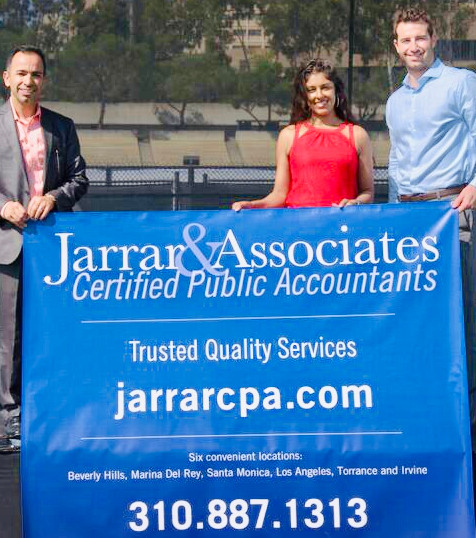What is Tax Liability?
If you pay taxes, you’ve definitely asked yourself this question at some point. We don’t want to fill you in on the details and explanations of accounting jargon. However, to understand tax liability, you must first familiarize yourself with assets and liabilities.
A Tax Account in Los Angeles describes assets as things you own, such as property, money, or a collection of limited-edition action figures. Liabilities, on the other hand, point to the money you owe to third parties. Here’s an example: your electricity bill is a liability.
So, what is tax liability? It’s the tax bill you owe to the federal, state, or local government body. Usually, most people refer to federal taxes when talking about tax liability.
Total tax liability
The total tax liability is the combined sum of money you pay the IRS in the form of capital gains tax, self-employment tax, income tax, and penalties or interests. Total tax liability also includes past taxes from previous years you haven’t paid.
Knowing your tax liability
When you join an organization as an employee, the first day passes as a blur of new faces and names. However, at some point, you’ll need to fill out a W-4 form. This paper determines how much money your employer holds back from your paycheck to cover your taxes.
To find out how much tax you pay, check the slip of paper you get at the time of cashing your check. You’ll also find the pertinent information in your online payroll platform. It’s actually beneficial to look at this data now and then to ensure your withholdings are perfect.
During tax season, if the withholdings from your paycheck are less than the total liability, you must satisfy the government by negating the difference. Conversely, higher withholdings will get you a refund.
You wouldn’t want to pay more in taxes at the end of the year only to get a pocket-warming refund. Why so? Getting a refund means you overpaid the government throughout the year. It’s money you’d have benefitted from keeping in your pocket, don’t you think?
That’s why everyone must understand tax liability. By adjusting your tax withholdings to match the total tax liability, you get zero refund, which you should aim for. Changing the withholdings does feel like you got a raise!
Speak to your employer about adjusting the W-4 form if you end up paying the IRS at the end of the year or get a massive refund. You must ensure you get enough taxes deducted to keep the government off your back.
Things are a bit more complicated for small business owners. You have to estimate your tax liability and make quarterly payments throughout the year. The goal, however, is the same: avoid overpaying or underpaying the IRS.
An example
Let us help you understand the concept with an example. Whenever there’s a taxable situation, you add to your tax liabilities. The most common one is the earned income. Your taxable income will be broken into income ranges or income brackets. Each range will be taxed at a specific rate.
Suppose, as a single filer, $60,000 is your yearly gross income. The standard deduction is $13,850, which leaves you with $46,150 in taxable income. As a result, you’ll be put into the 22% tax bracket. Ultimately, you have to pay around $10,000 in taxes. Or do you?
Here’s the best part: regardless of the bracket you become part of, you don’t have to pay that percentage value on your income. You only need to part with the portion landing in the said range. The government will cut taxes from the rest of income at the lower rates of every bracket your income fills up.
So, for the first $11,000, only 10% will be taxed. For the second portion, which is somewhere between $11,000 and $44,725, only 12% will be taxed. Everything above $44,725 will be taxed at 22%. Your grand total in taxes amounts to $5,460.50.
It’s a very simple example. Besides, other factors, such as exemptions, deductions, and tax credits, can dictate your total tax liability. That’s when things get blurry. Don’t worry, though. You can reach out to a professional to aid you in tax planning, support you to cover the bases, and help you sleep easy at night.
Searching for tax liability
Now, it’s time to find out how to locate your tax liability on the 1040 form. The IRS has been attempting to introduce a few changes to the 1040 form over the past few years to make filling it out easier. Nonetheless, it’s a government form with many intricacies. That being said, here’s where you’ll find your total tax liability.
Line 24 displays the total tax owed for the current year after credits and deductions. Don’t be alarmed! It’s is the amount you’ll pay before subtracting the sum you paid through the year via withholdings.
Line 25 is where you enter the value you’ve already paid. Add to it the amounts withheld from 1099s, W-2s, and other forms showing you didn’t hold back what you owed to the government.
List all the other payments you made and extra credits you may claim on lines, starting from 26 to 31. Add the values of lines 25, 26, and 32 to determine how much you’ve already parted with in taxes and additional credits. The total value will go on line 33.
If line 24 subtracted from line 33 equals zero, you’ve made it! You don’t owe the government anything and you won’t receive anything. Similarly, if the value of line 33 exceeds line 24, you’ll be refunded.
Don’t forget that you must compensate the amount owned if line 24 exceeds line 33. Don’t forget the IRS went easy on you, either. If the amount is above $1,000, you’ll be penalized further on your tax bill.
Reducing tax liability
There’s a way to reduce tax liability. All you need to do is to leverage deductions and tax credits you’re eligible for. These two things can reduce taxable income and put you in a tax bracket lower than the one you’re in. To be precise, the government will deduct only a small sum of your income.
When it comes to deductions, you can take the standard variant or itemize them. For the former, single filers had to pay $13,850, and married couples $27,700 last year. For the latter, itemization included mortgage interest or property taxes, specific medical expenses, etc.
This year, if your itemized deductions don’t exceed the standard deduction, you may take the standard deduction to ensure only a small sum of your income is taxed.
Another method incorporates using tax credits. These differ from deductions because credits cut down the dollar amount of your entire tax bill after applying the tax percentages.
Reduce tax liability further by contributing to 401(k) or other retirement savings accounts. Just keep in mind that it might not be the best option for you in the long run. After all, you’ll have to pay taxes on what you save when you start using the money after retirement.
Be confident
Everyone hates tax season, period! However, you don’t have to handle everything by yourself. Reach out to us to hire a Tax Accountant in Los Angeles. If the data provided above couldn’t satisfy your question “What is tax liability,” our expert definitely will.
Don’t hesitate to contact us if you think you need an expert tax accountant’s support!
FAQs
What are the consequences of underestimating tax liability and failing to make quarterly payments as a small business owner?
If you’re unable to make tax payments, the IRS will impose penalties on you for underpayment of estimated taxes. This will add to the interest from each payment’s due date. The penalty rate may change and increase if you continue unpaying the government. Complete failure to pay taxes will prompt the IRS to seize business property or place liens.
How do tax deductions and credits differ in their impact on reducing tax liability?
Deductions cut your taxable income by an amount you qualify for, resulting in a reduced amount of income subject to tax. Credits, on the other hand, directly reduce tax liability for every dollar.
What are some strategies for accurately estimating tax liability to avoid owing a significant amount at the end of the tax year?
You must maintain accurate tax records, use estimated tax calculations, adjust quarterly payments, try tax withholding, or consult a tax expert to manage tax liability throughout the year.
Also Read: How To Report ERC (Employee Retention Credit) On Tax Return 1120s?
Tips On How To Choose A Tax Accountant For Small Business

Hire an accountant now- if the phrase is haunting you a lot because efficient, in budget accountants are challenging to find, then fret not, as your search is almost over.
Hire an online accountant for your business as they may not be as important to choosing a spouse, but it comes pretty close. The right business tax accountant near me can do more than preparing your yearly taxes. The right person can help you with advice on management decisions, growing the business, payroll services management, and more.
Certified accountants can help you with the requirements and keep track of every transaction. Maintaining accounting books is crucial to your business as it allows you to make essential decisions for your business.
There are accountants if you search the term CPA near me for small business. You will get a long list of tax accountants on the screen and you will get confused before selecting.
Schedule A Consultation Today!
Why Do You Need To Choose An Accountant Carefully?

Every year, the IRS compiles a list of tax scams. Even though the scams are many, some of these include actions taken by shady tax professionals, including a promise of inflated refunds, false claim deductions, and credits, etc.
Unfortunately, just anyone can become a paid tax preparer. Most states have few to no requirements for training, certification, and competency testing.
Compile A List Of Tax Accountants
Like with the majority of service providers, a great way to find a personal CPA near me is to seek a referral. But don’t just go with their name- make a list of four potential accountants.
Scan The IRS Directory
The one qualification every paid tax preparer needs to have is the preparer tax identification number or PTIN. Anyone can apply online for free PTIN. So, this cannot solely be the deciding factor of the person’s experience and skill.
Related Article: What Are The Types Of IRS Tax Agreements And Plans?
Schedule A Consultation Today!
Check The National And State Associations
Many state boards of accountancy and state CPA societies maintain online member directories or can provide a list of best tax accountants near me in your area when you need it.
Now, not every CPA prepares taxes, so you may need to do some research online or call to see if people on the list provide the type of accounting service your business needs.

Narrow Down The Options
After you have made a list of tax preparers near you, it is time to narrow down your search regarding who’s best. Here’s what you need to do:
Verify The Credentials
If you got the tax preparer’s name from the IRS, a state CPA, or your state board of accountancy, be assured of their credentials.
However, if you got the name through referrals, it is a good idea to find if the person holds proper certifications they claim to own.
Read Reviews Online
Look at the potential accountant for tax filing near me or tax preparer’s social media accounts, websites, and more to see the sort of things they post there.
Read their online reviews on Google, Yelp, Angie’s List, and more. Google search their names to see what comes up and scroll through the first few pages of the search results to ensure nothing gets buried.
Anyone who works with the public has a negative review posted by disgruntled clients. However, if your search unravels red flags like a pattern of client complaints, move on to the next.
Interview Potential Accountants
When you meet a potential accountant, bring a copy of your recent tax return. Reviewing your last return is the best way for the tax expert to evaluate your situation and give you an idea of how much they may charge.
Be ready to let the small business tax specialist near me know about significant life changes you have experienced in the last year if you started a business or invested in a property.
If you are looking for a tax professional near you, look outside your geographical location. Though many people prefer face to face meetings, you are not limited to CPAs and tax advisors in the town.
Contact Us Today:
Locations:
5 Ways On How To Increase Cashflow For Startups
More than 30.7 million small businesses and startup companies are currently operating in the United States. 69% of entrepreneurs in the US started their businesses in their homes. The reason is to save money as much as possible. However, because of failing to improve cash flow, 50% of these startups get shut down within the first five years.
It happens because most of these startups fail to track their cash. Running the business without tracking the cash flow can bring down even the richest startup. An entrepreneur must be proactive regarding the finance of his startup.
Managing the cash flow is not tough if you know the tricks. But before you know how to increase cash flow in small businesses or startups, you must be aware of what is cash flow management?
What is the cash flow?
Cash flow is the metric to measure the amount of cash that comes in or out within a time frame. Often, a business gets money from sales, return on investments, and loans. However, the money goes out on loan repayment, utility bills, taxes, etc. For running the business successfully, one must know to balance the in and out of the cash flow.
However, one thing needs attention here, and that is the cash flow is different from profit. Hence, your earned profit in the business may not suggest the condition of the cash in the company.
Schedule A Consultation Today!
Now, as you know what cash flow is, here are ways to increase cash flow in a business.
1. Collect the Debts as Quick as Possible
The easiest way to improve cash flow is to collect the debts and bills. Consider it if you have customers and clients who often fail to pay the bills on time. Even if you are not able to collect the full payment, partial payments can also improve the cash flow.
However, for a quick and timely payment, discounts can work best. On the other hand, you can penalize the people for the late payments provided you mention this in the sales agreements.
2. Control the Expenditure
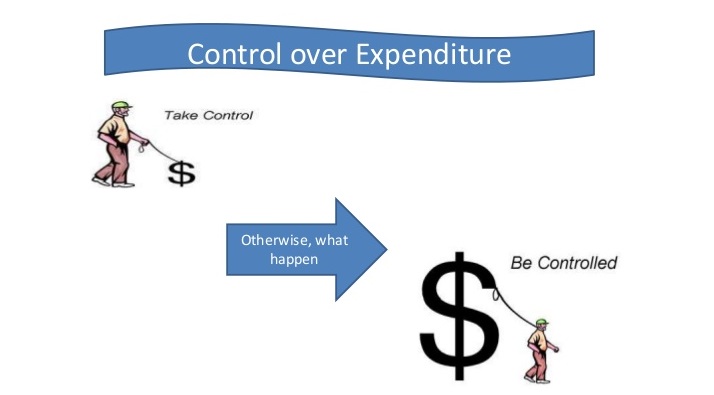
For proper cash flow, you must prioritize the spending. Figure out what is necessary for the business and what are the elements which are not essential. As a startup company, every single penny is crucial. If you run a small e-commerce, decoration of the office is not less important, unless clients visit the office. On the other hand, you must focus on timely delivery. Thus, you can hire or buy trucks.
Figure out what will increase the amount of cash in the business. Spend money on essentials only helps to increase cash flow for startups.
Schedule A Consultation Today!
3. Pay the Bills at the End
While paying the bills or utility charges, try to avoid the cash and debit cards. Using them will drain out the cash instant. For paying the bills, wait till the last few days of the deadline, or the time till when you can avail of the payment discount. Further, if possible, use the zero interest credit cards for paying the bills. It will ultimately offer your cash a prolonged period to stay in the bank.
The much the cash stays in the bank will benefit you more and help in managing the cash flows better.
4. Keep the Cash in Reserve
As per the records, 55% of the businesses with five or fewer employees can only cover one months’ expense from their savings. Further, 30% of the companies don’t keep that reserves too. Thus, these businesses often succumb to these financial vulnerabilities. The report suggests that 31% of the owners say they need to use personal credit cards to borrow the money, and 15% said that they could not cover that expense.
Hence, don’t allow the situation to go to that extent. Keep always emergency funds for the business. It may slow down the growth, but in the end, help in the long run.
5. Get a Professional Help
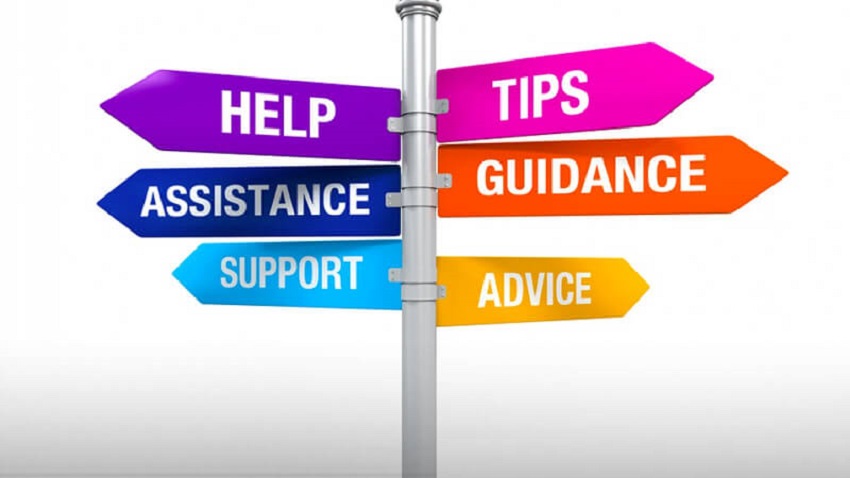
An entrepreneur needs to manage several works. Often, they able to give time to the finance section that it deserves. Hence, in such a situation, the startup should take help of professional bookkeepers or small business accounting services.
Based on the effectiveness of cash flow management, companies develop their financial and tax planning strategies. Thus, it is better to consider hiring a professional as an initial investment for your business.
Bottom Line
Profits are not worthy enough without any cash in hand. Startups and small businesses that understand cash-flow management early can handle the businesses better.
In case you require any expert opinion to improve cash flow, please feel free to connect with us.
Contact Us Today:
Locations:
How Does Accounting Help In The Success Of Small Businesses?
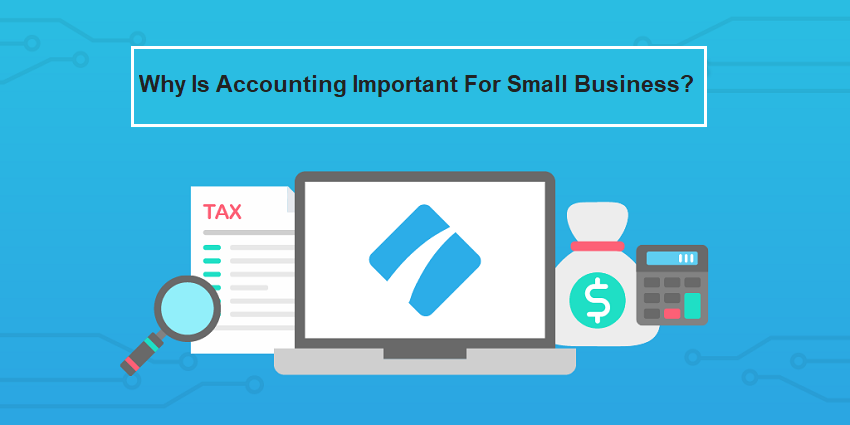
Accounting helps small businesses stay ahead by offering insights into your company’s financial health. It deals with precise reporting on cash flow, demonstrating growth opportunities, and keeping your business organized during tax filing.
As small business organizations, you may choose to look after business accounting all by yourself or can hire experienced accountants for assistance while preparing financial documents, managing payrolls as well as filing taxes, etc.
To put it in easy words, you don’t need to be an accounting expert, just need the right understanding or assistance of a skilled accountant to understand how to do accounting for small business.
Schedule A Consultation Today!
Why Is Accounting Necessary For Businesses?
Accounting not only makes life easier during tax season but also gives you a good understanding of how businesses must perform financially.
Proper accounting can even make you appear attractive to the clients. Here are some ways professional accounting can help you appear valuable to your clients.
Get financial stability
When you have your finances in order, you have a proper idea of the amount coming in and going out. You can even create better forecasts for future revenue and expense, so you can ensure you have cash reserves ready for your tough times.
It is one of the reasons why you must go about hiring an accountant for small business. With stable finances, you can offer positive and consistent assistance to your clients. You also wouldn’t need to cut down costs due to financial crisis or cut down on your employees.
Better efficiency
Proper business accounting offers you timely financial data about your small business. It can help you make clear decisions about the need for, the timing of, new investments for your business.
Moreover, it can help you make the right decision and act when it comes to matters related to equipment purchase, etc.
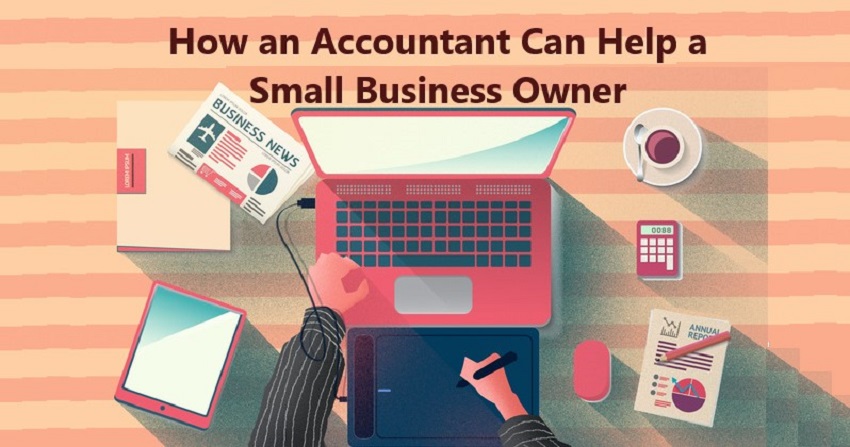
What Does An Accountant Do For A Small Business?
Hiring accountants have undeniable benefits that you can only understand once you hire an expert. But how important is an accountant to a business? Well, the answer may surprise you.
Schedule A Consultation Today!
Assistance in the loan process
Kick-starting a business involves taking a loan. Having an account by your side can be helpful. It is because he understands your financial condition and can help you present the loan purpose and consider different options for business financing.
Reviews contracts and documents
When you are entering into any agreement with tax or accounting implication, it is always best to let your accountant review the contractual document.
Accountants can analyze agreements and let you know the tax and accounting consequences better than anyone.
He can also guide you on your business’s financial prospects. These help you avoid negative consequences related to financial planning, cash management, insurance, and financial statements.
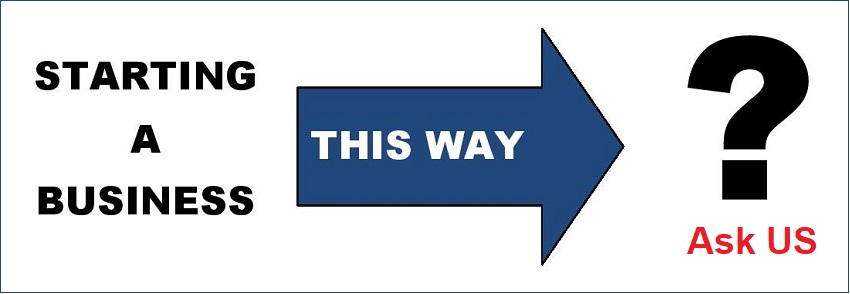
What Questions To Ask Your Accountant When Starting A Business
After you have got your professionals listed, you need to choose one. The first task would be to list down questions you need to ask the accountant.
Do they have proper experience?
Talk to the accountant regarding his expertise, if he has experience in similar sized business with equivalent business aspects. Inform him at what stage your business is currently: settled or start-up business.
Schedule A Consultation Today!
Are they responsive enough?
If hiring from a firm, ask who will take care of your business accounting. It is crucial to know who needs to get in touch with and do follow-ups. Talk about their availability; consider how responsive they are to your needs, etc.
Do they remain up-to-date with current accounting rules?
Talk to your accountant and find out about his financial record-keeping. Since money laundering and tax laws change frequently, accountants must stay up-to-date and well informed.
Don’t forget to check their communication and see how frequently they return emails and calls. These are all parameters when thinking about how to find an accountant for small business to get streamlined services.
Contact Us Today:
Locations:
Why And How Long To Keep Business Records For Tax Purposes?
For many new small business entrepreneurs, the first year is actually the hardest. First, you need to decide what form of business you actually want, then there’s extensive business record keeping.
Bad record-keeping can be a big pitfall if you are a small business owner. You can avoid headaches when you are filing your tax return, keeping business records for tax purposes becomes useful. You need to keep the records all through the year.
Everyone in business must keep tax records for small business. Good business records will surely help you do the following:
Monitoring the progress of the business
You definitely need good records to monitor your business’s progress. Records can show whether your business is improving, which items are selling or what changes you need to make.
Do you know that good records can actually increase the chances of business success? But, how to find business tax records? Read on and you will find out.
Project the estimated tax payment
During the first year of business, you will need to project the tax liability so that you can make the estimated tax payments. Estimated tax is the method used to pay tax on come is not subject to withholding.
When you are dealing with tax preparation, keeping the business records can actually be a lot of help. Estimated tax is used to pay income tax and self-employment tax, as well as other taxes and amounts reported on the tax return.
Preparing the financial statements
You need good business records for tax purposes to prepare accurate financial statements. These include income such as profit and loss statement as well as balance sheets. These statements can really help you deal with the bank creditors and manage your business, well.
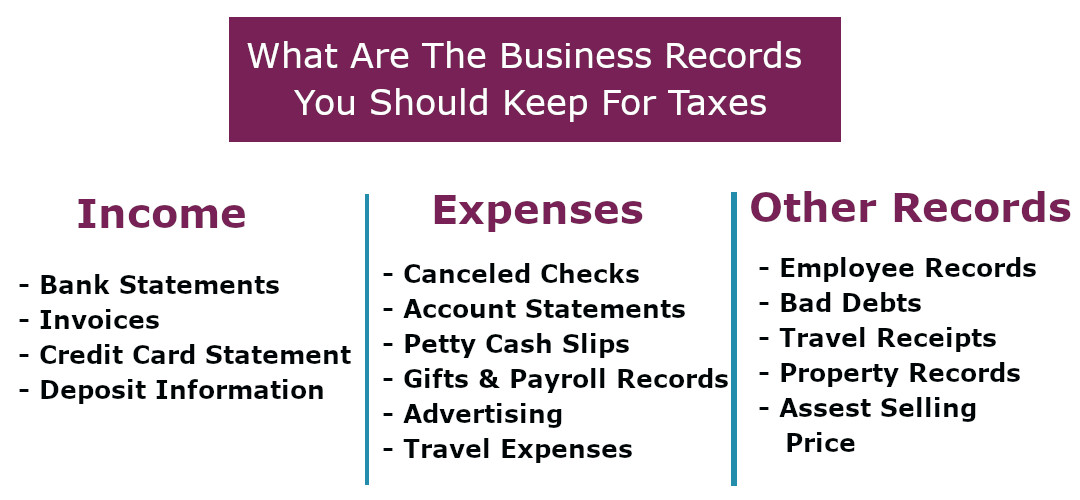
Preparing the tax return
You also need good business records to prepare tax returns. These records support the expenses, income, and credits you report. Now, these are the same records you use to monitor the business and prepare the financial statements.
Now, you may wonder how to find business tax records. This is easy. Every business leaves a paper and electronic trail of tax records, business licenses, corporate filings, financial statements, etc.
If you are a small business owner, you can find tax records information online and hard copies at government offices.
So, once you know why you should keep business tax records, your next questions may be how long should you keep it. Let’s see.
How Long Should You Keep Business Tax Records?
Good business recordkeeping allows you to prepare the financial statements, helps you keep tabs on the expenses as well as comes in handy in case you get audited or sued.
But did you know the IRS requires you keep the business records for tax purposes? Let’s find out which records you are legally allowed to keep and how long you must keep it. Also, how to ensure that you don’t lose it, at all.
| Record type | How long to keep it |
|---|---|
| Previous tax returns | 3 years |
| Receipts | 3 years |
| Miscellaneous financial records | 3 years |
| Employment tax records | 4 years |
| If you omitted income from your return, keep records for.. | 6 years |
| If you deducted the cost of bad debt or worthless securities, keep records for.. | 7 years |
The Eight Small Business Tax Record Keeping Rules
You never know which record you need when dealing with tax preparation, so keep these handy.
- Always keep bank statements, receipts, payroll records, invoices, receipts and any document that supports an item of deduction, income or credit shown on the tax return.
- The most supporting document needs to be kept for at least three years.
- Keep employment tax records for about four years.
- If you omitted income from the tax return, ensure you keep the records for at least six years.
- If you deduced the cost of bad debt, keep the records for up to seven years.
- It is better to get the documents electronically backed up and go paperless.
What receipts to keep for taxes?
As much as you live by your words, the IRS requires that you keep documentation that includes your income, deductions, credits you report on the tax return.
Here are the main records you must keep for tax preparation:
- Cash register tapes
- Receipts
- Deposit information such as cash and credit sales
- Invoices
- Credit card receipts
- Bank statement
- Tax filing
- Payroll records
Are there documents you don’t need to keep?
It is impossible to keep all the documents. Receipts at times get lost, especially for small expenses. But can you still claim those receipt-less expenses as tax deductions?
Maybe, but the expenses need to be less than $75. You can get away with not keeping tax records for small business for three reasons:
- The expense is less than $75. (This isn’t applicable for lodging expenses)
- The expense is for transportation and it is not possible to have a proper receipt.
- You are reporting meals and lodging expenses under an accountable plan.
Wait, in order for the IRS to uphold a deduction under $75 without any receipt, you need to present them with:
- The expense amount
- Where and when it was made
- The essential character or purpose of your expense
The easiest way to keep the records
The IRS suggests that you can use any recordkeeping system as long as it shows your expenses and income. However, the IRS accepts digital copies of documents as long as they are identical to original copies.
No wonder, digitizing the records is the best way to prevent accidentally tossing them in the trash can. Also, paper records can fade and are susceptible to damages.
It is better to scan each record and receipt in your business and archiving forever.
Concluding words
When dealing with tax preparation and wish to avoid the IRS audit, it is better to stay sorted. One of the most important things is to keep the necessary business records. So, before tossing them up, double-check whether you or anyone else you do business with might need it.
Contact Us Today:
Locations:
Why Should You Keep Business And Personal Account Separate?
Small business owners should operate in a business to realize the tax breaks at their disposal. For example, if you meet the requirements, you can deduct necessary and ordinary business expenses.
But business owners often find themselves in tax trouble when they mix business with personal matters. This mistake is also a prime target for IRS scrutiny in audits.
You must keep your business account separate from personal account for various reasons. The accountant helps you with this matter.
Why Not Mix Business And Personal Accounts?
There are reasons illustrated stating why it is not a good idea to mix business and personal accounts:
- It doesn’t look professional: you are dealing with a customer and pull out a personal checkbook or credit card to pay a business expense. Now, this gives the impression that you are not the real business owner.
- In the same way, lack of separation screams “hobby” to the IRS. The IRS is quick to deny deductions and losses for hobbies. If you want the IRS to look at your business as legitimate and not any hobby, keep the personal and business accounts separate.
- Your income and business deductions don’t have a distinction. If you want to claim expenses as deductions, you must be able to show these deductions were for the business purpose.
- Sorting personal records during tax time can become a nightmare. Capture the business expenses in your business account to make it easier to claim the deductions.
- You may get audited by the IRS. Now, the IRS is likely to audit the business and deny deductions and business losses. This happens if you don’t have a clear separation between business and personal expenses.
If you have a home-based business, for instance, the IRS may not allow home business expenses if they are not separate.
Small business accounting services can help. The experts know how to offer you the assistance so you can separate the business account from the personal one.
-
Arms-length transactions
All transactions between you personally and the business should be an arm’s length. This means, the transactions clearly separate you as the personal entity and the business as the entity.
-
Keeping distinct accounts
Most importantly, set up separate checking accounts for business and personal use. You must write checks for business purchases from your business account and personal purchases from the personal one.
In other words, put business income in the business account and personal income in your personal account. Keeping the business account separate from the personal matters.
-
Make this official
Consider establishing a limited liability company (LLC) or an S Corp for your business.
Sit down with your accountant and determine what entity makes the most sense, how this business will impact the taxes and financial plan, etc.
The business entities will give your personal finances a new level of liability protection, that must come in handy if the business gets sued.
-
What if you make a mistake?
To err is human. Just ensure you document the mistake and edit the transaction in the business records. For instance, if you deposit a personal check in the business account, label it as owner’s equity.
If you need to take the money back out, enter the check as the draw on your owner’s equity. When you forget to pay for something with the personal credit card, consider it an investment.
Every transaction should have proper labels, at arm’s length, and reasonable.
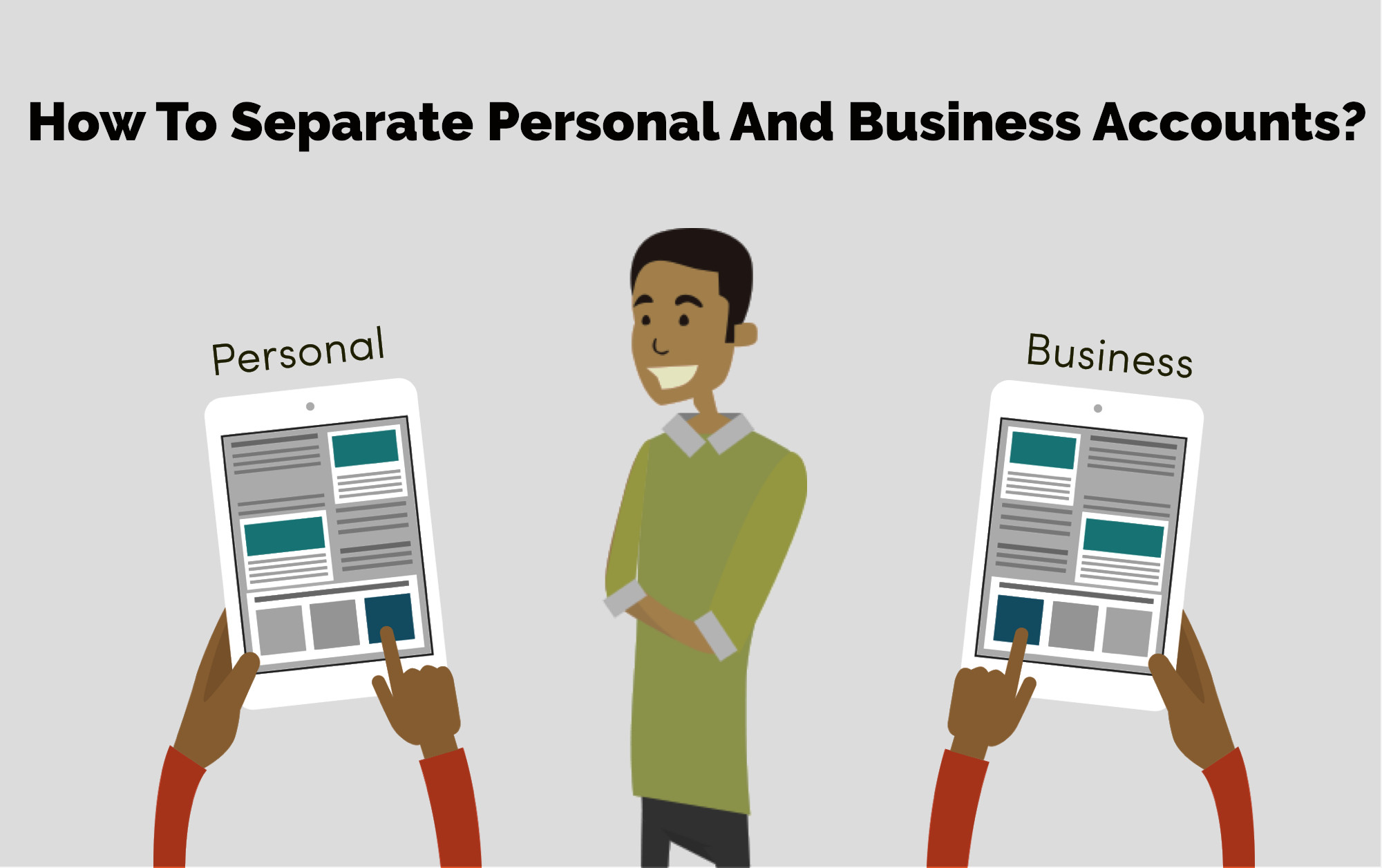
How To Separate Personal And Business Accounts?
Luckily, small business owners who haven’t separated their expenses can still do so by following some tips:
-
Register The Business
The first step to separate yourself from the business is officially registering the business.
There are several business structures you can choose from. Your accountant will help you pick the right one as per your need. Incorporations offer the strongest protection to its owners from personal liability, enhances the business credibility and gives easier access to capital.
However, incorporations also come at a higher cost than other business structures, including high taxes, etc. Ensure you do your research on business structures before registering.
-
Open The Business Account
An efficient way to separate the personal and business accounts is to divide them into separate, designated bank accounts.
After you receive the EIN, open the checking and savings account in the business’ name. The number of banks requires an EIN to open a business account. Conduct the transactions through business accounts.
Bottom Line
Finally, it is mandatory to keep business account separate from personal. Diving your personal and business finances is the first step to transforming the idea into a reality.
After your small business becomes a registered entity, a business becomes a reality. Separating finances will help ensure it succeeds.
Contact Us Today:
Locations:
How to Respond to A Letter or Notice from the IRS?
The letter one expects from the IRS is a refund cheque. However, it doesn’t happen in most cases, and the letter you get from IRS often relates to the tax return. Over here, the point of discussion is how to respond IRS letters.
IRS communicates directly with the person they believe has done something wrong during tax return. In case IRS sends you a letter, there is nothing to get panicked. You need to go through the letter or notice to understand the reason for contact and the way to proceed further.
But before, telling you the ways to handle the IRS letter or notice, you need to understand why IRS sends you the notice?
Here are some reasons for which IRS sends Notice:
- You have a balance due
- You are due a larger or smaller refund
- We have a question about your tax return
- We need to verify your identity
- We need additional information
- We changed your return
- We need to notify you of delays in processing your return
Remember, IRS do not for ask money, unless you are doing some mistake. Now, as you already understand the reasons for getting the notice, you are thinking about how to reply IRS letter. So, here are steps that you need to follow.
Nothing to get panicked
You need not panic one you get a letter or notice. Carefully read the letter or notice. Most of the letters contain the process one needs to follow. Further, all the notices give ample time to the tax payers to deal with the matter. Most of the notices resolved only after one or two discussions. However, irrespective of the reason for sending the letter, most of the notices are not a call for alarm. It is important to know how to respond IRS letter
Confirm the Authenticity
Several fraud IRS scams are reported in recent times. Thus, once you get a letter from the IRS, you check its authenticity. You can call the IRS to verify that is it sent by them or not. If IRS mailed you, then they will agree and instruct you for the further. However, if the IRS did not send you anything, then they will help you find out the scammers.
Read Carefully
If the IRS mailed it, then as mentioned, it is important to read out the notice carefully. Most of the notices are about the federal tax return. However, the notice is related probably any specific issues such as changes to tax payers’ account. The notice may ask you about more information such as you owe tax and that you need to pay the amount that is due.
The notice also comes with the process to deal with the matter. So, reading the notice carefully solves your half of matters. If you are still not understanding how to reply IRS letter, then you must contact your accountant related to it.
Take the Action
Once you went through the letter, now it is time to take the action. You know the action that you need to take as mentioned in the notice. However, you must not ignore it by any means. Your ignorance may make the IRS take other steps against you.
You can directly call the IRS office to know more details process regarding how to respond IRS letter. You can also take the help of the accountants for this.
Reach Out to IRS with Your Response
If you agree with the notice, you need not respond with an explanation. You need to fill up the Notice CP-2000 form along with the proposal to adjust your income and credits or deductions. Once you fill the form and send it to the IRS, they will make the changes.
However, in case you are not happy with the notice from the IRS, you can inform them. However, in such a situation you must not fill CP-2000 response form. You can send a separate document including:
- The reasons you disagree
- Your phone numbers
- Best time to reach the IRS
Keep the Copies
Keep all the copies of the letters and document that IRS mailed you. However, you must also keep the copies of the replies you mailed them.
Bottom Line
There is nothing to panic once you get a letter from the IRS. You need to go through the letter and decide how to respond IRS letter. You can take the help of professional accountants who know how to deal with this.
 |

A letter from IRS makes you tensed? Do you receive a letter or notice from IRS? Are you tensed about it? You do not need to be tensed as IRS letter may come for any reason. Get in touch with us to further proceed with the letter officially.
|
Contact Us Today:
Locations:
How Much Do You Need to Pay To The IRS?
When you do not file proper tax returns or when you file an inaccurate return , you have a tax debt. However, figuring out if you owe IRS money or how much you owe can be a challenge. The tax code gets complicated, and it changes each year.
Depending on the situation, you may need to find answers to the questions related to tax audits. Here a tax professional can help you.
Here is some information to help you find whether you owe the IRS money and how much.
Why Should You File Tax Returns?
The law requires individuals and businesses to file tax returns annually. If you don’t owe any money to the IRS, you may still need to file a tax return for reporting.
It is a common misconception for taxpayers to assume that you don’t need to file a return if earned income is below the foreign earned income exclusion.
The fact is that there’s a tax liability until a return gets filed to claim the exclusion benefit. If not filed timely, you may lose the right to claim the benefit. It is essential to avoid the situation of filing taxes late.
No one wants to come under the IRS tax audits scanner.
If you don’t file the taxes on time when the law requires you to do so, you will face penalties. If you fail to pay the taxes you owe, your penalties will be greater. Filing the required tax return before the due date and paying the tax debt to the IRS is important.
The specific filing requirements for taxpayers change annually. So, this is important to stay up-to-date on the latest news so you can ensure you comply at all times. If you aren’t sure whether you need to file a return. You must contact a tax expert for assistance.
Understanding Interest And Penalties
The IRS assesses penalties and interest on unpaid tax debts for several reasons. Some of the most common penalties charged include:
- Failure to file
- Failure to pay tax
- Failure to pay estimated tax
When you don’t file the required tax return, the penalty will be equal to 5 percent of the unpaid tax you need to report on the return.
If you do not pay the tax, they require you to pay, you will owe an additional penalty assessed on your tax debt. The penalties will continue until you have paid everything you owe.
Many taxpayers will owe more than one type of penalty when they have a tax debt. Depending on this amount of debt, these penalties can accumulate. For this, it is essential to act when you learn that you have unfiled tax returns or unpaid tax debts.
No matter what, hiring experts to prevent tax audits will be helpful always.
How Do I Know If I Owe The IRS?
Many taxpayers aren’t sure whether they owe any money to the IRS. You should find out how much you owe the IRS. It can lead to confusion when you live and work overseas. You may owe the money to the IRS if:
- You meet the filing requirements but didn’t file- the IRS has established basic requirements that show when you must file a tax return.
The requirements apply to all taxpayers, including those who live and work abroad. Also, the exact amount would depend on your specific situation.
- You have received IRS notice- In most cases; the taxpayers owing money to the IRS receive a notice indicating the amount they owe and demanding payment.
If you received such notice of tax audits from the IRS, you owe money and need to take action to revolve the debt soon.
Contact Us Today:
Locations:
How to Choose Which Type of Business Entity Will Suit You?
Million things one needs to keep in mind while starting a business. The owner needs to handle things like, raising funds, hiring staffs, fabricating marketing strategies, paying salaries, etc. However, before all these, you need to know the type of business entity structures and what is entity formation.
Your sole decision can influence your legal and financial sides of the business. The taxation of a business largely depends on the entity type of your business. Based on the entity type you can also get loans and can ask the investors to raise the money for the business.
In this post, the four business entity types will be discussed with their pros and cons, which are generally selected by the small business owners. It will help you to know how to choose the right business entity?
These are as follows:
- Sole proprietorship
- C-corporation
- S-corporation
- Limited Liability Company (LLC)
Sole Proprietorship
A sole proprietorship is a simple business entity where there will be a sole owner or operator of the business. In case you are launching a business on own, it will automatically come under the sole proprietorship entity formation. There is no need of registering the business with the state, but only the owner has to get the local business permits or licenses needed for the injury.
Pros
- Easy to start
- No corporate formalities or paperwork
- You can deduct most business losses on your tax return
- Easy to file the tax returns by simply filling Schedule C-Profit or Loss from business to your income tax return
Cons
- Being the sole owner, the liabilities & debts depends on you
- Difficult to get loan or investors
- Hard to build business credit without registering the business entity
C-Corporation
A C-corporation entity formation is a completely separate legal entity without having any connection with the owner of the business. The entity is controlled by the Shareholders (the owners), a board of directors, and officers. However, a single person can play all the roles. So, without any hassle, you on own can handle all these.
Pros
- No personal liability of the owner for the debts and liabilities
- Gets more tax deduction than other types of entities
- The owner usually pays low self-employment tax
- The stock option enables you to raise more funds
Cons
- Expensive to create such an entity, difficult for startups
- Double taxation as the company pays tax on the corporate tax return and individual shareholders on personal tax returns
- Owners won’t be able to deduct business losses on their tax return
S-Corporation
The S-corporation preserves the limited liability but offers a pass-through entity to the owners for tax matters. No corporate-level taxation is there in the S-corporation.
Pros
- Owners are not personally liable for company liability and debts
- No corporate taxation and no double taxation
Cons
- Creation of an S-corporation is a costly affair. It is difficult for a startup with limited capital to go for S-corporation entity formation.
- Limits are more in issuing Stock in S-corporation than of C-corporation
- Needs to maintain all the corporate formalities
Limited Liability Company (LLC)
It is probably one of the most preferable entity formations among the business owners. LLCs offer limited liability protection, but the amount of paperwork and other requirements are very less. Another important aspect of LLC is that it offers you to choose how IRS will tax you such as a corporation or a pass-through liability.
Pros
- No personal liability for the debts or liabilities of the business
- Option to choose how IRS will tax you such as a corporation or a pass-through liability
- Very fewer corporate formalities to follow
Cons
- Expensive to create the LLC in compare to any other entity formation
Final Words
Over in this post, four of the most used business types are being discussed. In case, you are looking for any advice you can get connected with us.
However, if have to smooth to say, please feel free to comment. It will be great to from you.
Contact Us Today:
The Ultimate Checklist for Small Business Accounting
Managing a small business may sound a small task, but it is exactly the opposite. One of the prime reasons behind it is the workload that a small business owner needs to handle. Among the different works, it is the accounts which remain neglected in most of the cases. Small business accounting is not difficult to manage if one will move systematically.
It is better to make a checklist if you want to handle your works all alone. Over here in this post, four different checklists are given that will help you to manage your accounts work without any kind of hassle. The accounting checklist is divided into five parts as follows:
- Daily Accounting Tasks
- Weekly Accounting Tasks
- Monthly Accounting Tasks
- Quarterly Accounting Tasks
- Annual Accounting Tasks
Here are the details of the checklist

Daily Accounting Tasks
Any business runs on the cash, and you cannot overlook the inflow and outgoing cash. It is important to check the cash amount that you have in your hand. Additionally, the checking helps you to understand what amount you are going to receive or need to pay to others. Keeping these in the mind daily can help you in maintaining day to day affairs.
Weekly Accounting Tasks
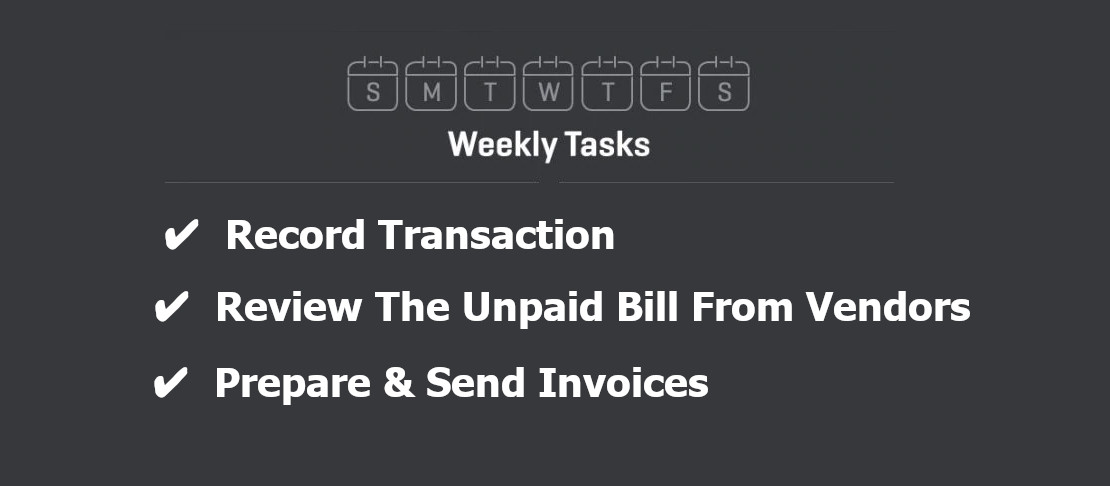
Record Transaction
Recording all the transactions such as billing customers, receiving cash from customers, paying vendors, etc. are essential for small business accounting. You should keep the records at least weekly to ensure the smooth running of your business. Using bookkeeping can help you in this matter.
Review the unpaid bill from vendors
One must keep a separate folder for unpaid vendors. You should keep track of the amounts that are needed to pay. Few vendors offer a discount on early payments also.
Prepare and send invoices
You must ready all the invoices during the weekend. It is a good idea to prepare the invoices, and send them in the weekend as during the week you might remain busy.
Monthly Accounting Tasks
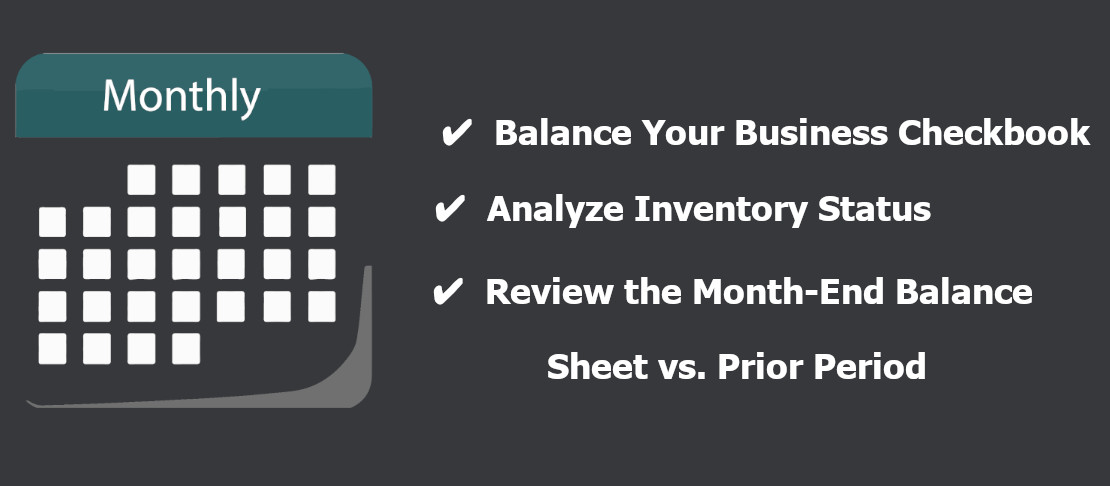
Balance Your Business Checkbook
Once a month, you must look at the checkbook of the business. You will be able to understand that the cash inflow and other transactions are okay in that or not. You can also be able to know that all the transaction and entries are done in the right manner or not.
Analyze Inventory Status
In case you are having any inventory then you need to look at that at least once in the month. A regular check can help you in making the adjustments during small business accounting as you will neither have a shortage or overload.
Review the Month-End Balance Sheet vs. Prior Period
By checking the balance sheet of the current period with the early period, you can get a possible picture of the business that you are running. You can be able to point out where the business is lacking and can manage it.
Quarterly Accounting Tasks
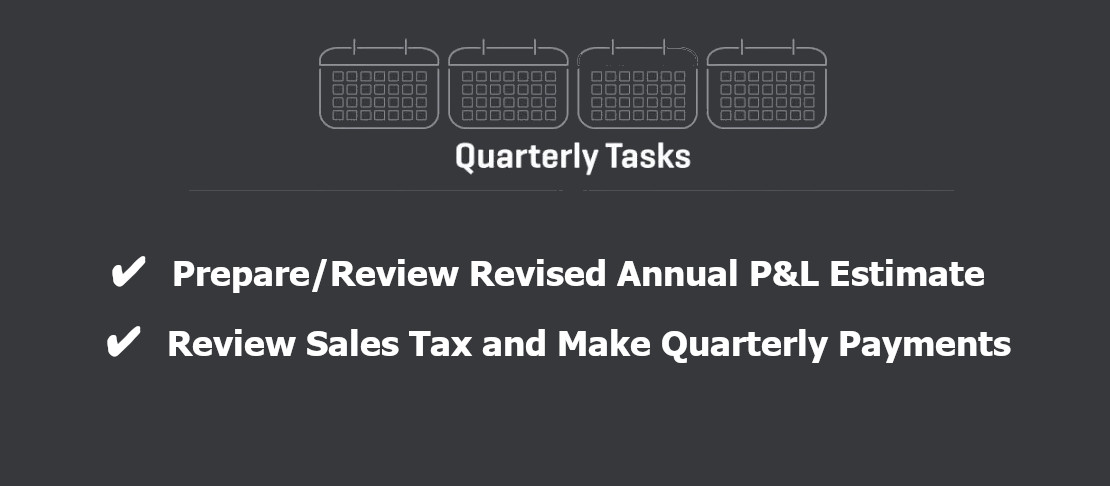
Prepare/Review Revised Annual P&L Estimate
You must revise and review all the annual estimation. You should also assert that do your assets are going up or down, the difference between revenues and expenses, etc.
Review Sales Tax and Make Quarterly Payments
You should also look in matters like tax and quarterly payments of the taxes. The U.S. Small Business Administration (SBA) can help you determine your state tax obligations.
Annual Accounting Tasks
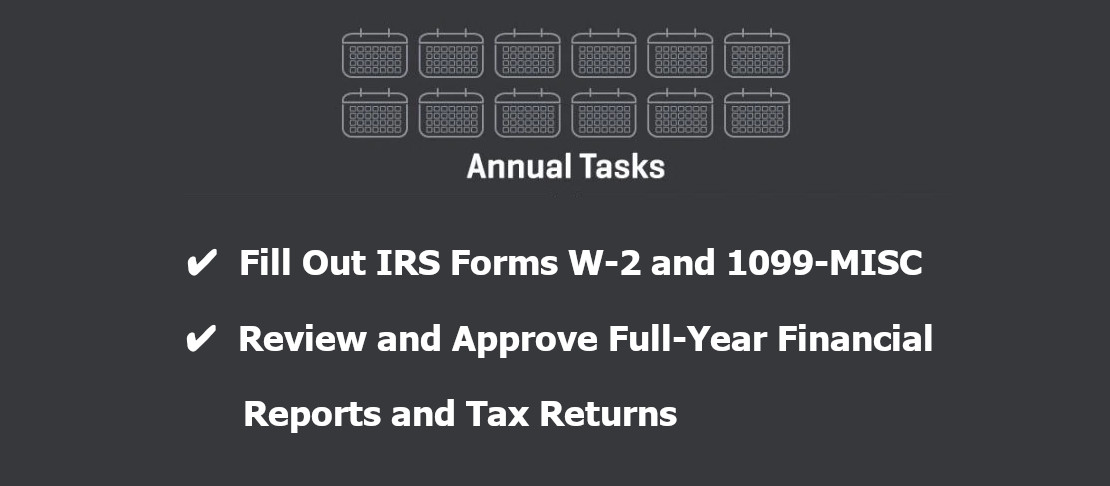
Fill Out IRS Forms W-2 and 1099-MISC
You must fill and report the annual earnings of your full-time employees (W-2s) and most independent contractors (1099s). For any contractors who earned less than $600 a 1099 form is not required.
Review and Approve Full-Year Financial Reports and Tax Returns
You must check all the documents finally before you submit the tax returns finally. For a smooth small business accounting, you should hire a professional accountant who can help you in the tax preparation and internal accounting.

